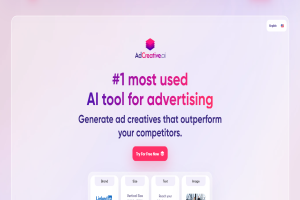Tool List
Top AI Tools for Digital Marketing
AI tools for digital marketing empower businesses to optimize campaigns, personalize content, and analyze data for better decision-making. These tools automate ad targeting, email segmentation, and social media scheduling, improving efficiency and ROI. Costs for AI digital marketing tools vary widely, with some offering free versions or pay-per-click pricing while others charge monthly subscriptions from $50 to $500 or more. AI in digital marketing is crucial as it enhances targeting, increases engagement, and delivers more relevant content to audiences, making it a key driver of success in today's digital landscape.
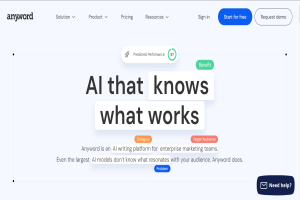
Anyword
Anyword is an AI writing platform Categoryfor enterprise marketing teams.Target Audience Even the largest AI models don...

Marketing Blocks
Let AI Create All Your Marketing Content Without using expensive agencies, time-wasting freelancers or outdated tools...
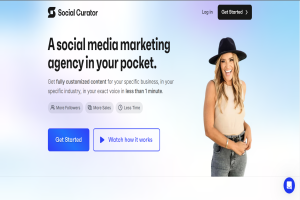
Social Curator
Get fully customized content for your specific business, in your specific industry, in your exact voice in less than 1 m...
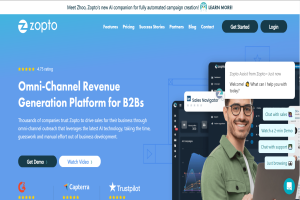
Zopto
Thousands of companies trust Zopto to drive sales for their business through omni-channel outreach that leverages the la...
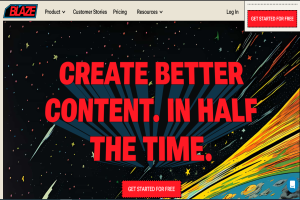
Blaze
Produce blog posts, social media content, ad copy, and marketing briefs - all in your brand voice.
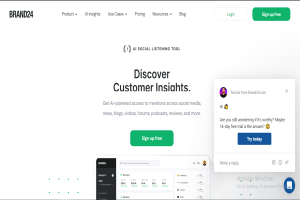
Brand24
Get AI-powered access to mentions across social media, news, blogs, videos, forums, podcasts, reviews, and more.
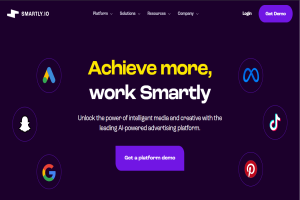
Smartly
Unlock the power of intelligent media and creative with the leading AI-powered advertising platform.
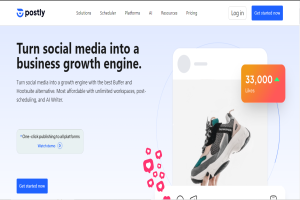
Postly
Turn social media into a growth engine with the best Buffer and Hootsuite alternative. Most affordable with unlimited wo...
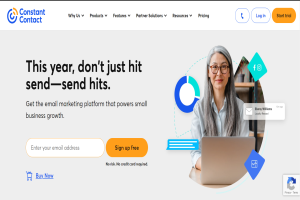
Constant Contact
Get the email marketing platform that powers small business growth.
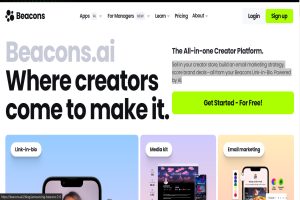
Beacons
Sell in your creator store, build an email marketing strategy, score brand deals—all from your Beacons Link-in-Bio. Powe...
Frequently Asked Questions
AI tools for digital marketing are software applications that utilize artificial intelligence technologies to automate, optimize, and enhance various digital marketing strategies, including content creation, ad targeting, customer segmentation, and performance analysis.
AI enhances digital marketing efforts by analyzing large datasets to identify trends and insights, automating repetitive tasks, personalizing customer interactions, and optimizing marketing campaigns for better engagement and conversion rates.
Yes, AI tools can assist in creating content by suggesting topics, generating textual content, optimizing headlines, and even creating simple graphics and videos based on the target audience and marketing goals.
AI-driven customer segmentation involves using machine learning algorithms to analyze customer data and identify distinct groups based on behavior, preferences, or demographics to tailor marketing strategies more effectively.
AI tools can automatically manage and optimize PPC campaigns by analyzing click-through rates, conversion rates, and other performance metrics to adjust bids, change ad placements, and modify ad copy in real-time.
AI enhances email marketing by personalizing email content, optimizing send times based on when users are most likely to engage, and segmenting email lists more effectively to increase open and conversion rates.
In social media marketing, AI tools can automate content scheduling, analyze user engagement, suggest content improvements, and target ads based on user behavior and preferences.
AI tools use historical data and machine learning models to predict future customer behavior, marketing trends, and campaign outcomes, allowing marketers to make proactive decisions.
AI tools can analyze search engine algorithms, suggest keywords, optimize website content, and improve site structure, helping to enhance SEO rankings more efficiently than manual methods.
Yes, AI can dynamically personalize website content and layout for each visitor based on their past interactions, browsing behavior, and personal preferences to increase engagement and likelihood of conversion.
AI analyzes user behavior on websites to identify patterns that lead to conversions and suggests changes to funnel design, content, and calls-to-action that can improve conversion rates.
Challenges include ensuring data quality, managing data privacy concerns, integrating AI with existing marketing tools and strategies, and keeping up with the rapid evolution of AI technologies.
Small businesses can use AI tools for cost-effective solutions like automated customer service via chatbots, targeted ads, and personalized email marketing, all of which help to level the playing field with larger competitors.
Ethical considerations include concerns over customer privacy, the transparency of AI-driven decisions, and avoiding biases in AI algorithms that might lead to unfair customer treatment or discrimination.
The future of AI in digital marketing is likely to see even greater automation of marketing tasks, more sophisticated personalization, improved customer insights through enhanced data analytics, and seamless integration across all digital marketing channels.
Frequently Asked Questions
Q: What are AI tools for digital marketing?
A: AI tools for digital marketing are software applications that utilize artificial intelligence technologies to automate, optimize, and enhance various digital marketing strategies, including content creation, ad targeting, customer segmentation, and performance analysis.
Q: How can AI improve digital marketing strategies?
A: AI enhances digital marketing efforts by analyzing large datasets to identify trends and insights, automating repetitive tasks, personalizing customer interactions, and optimizing marketing campaigns for better engagement and conversion rates.
Q: Can AI tools help with content creation?
A: Yes, AI tools can assist in creating content by suggesting topics, generating textual content, optimizing headlines, and even creating simple graphics and videos based on the target audience and marketing goals.
Q: What is AI-driven customer segmentation?
A: AI-driven customer segmentation involves using machine learning algorithms to analyze customer data and identify distinct groups based on behavior, preferences, or demographics to tailor marketing strategies more effectively.
Q: How do AI tools optimize PPC (pay-per-click) campaigns?
A: AI tools can automatically manage and optimize PPC campaigns by analyzing click-through rates, conversion rates, and other performance metrics to adjust bids, change ad placements, and modify ad copy in real-time.
Q: Can AI improve email marketing?
A: AI enhances email marketing by personalizing email content, optimizing send times based on when users are most likely to engage, and segmenting email lists more effectively to increase open and conversion rates.
Q: What role does AI play in social media marketing?
A: In social media marketing, AI tools can automate content scheduling, analyze user engagement, suggest content improvements, and target ads based on user behavior and preferences.
Q: How do AI tools perform predictive analytics?
A: AI tools use historical data and machine learning models to predict future customer behavior, marketing trends, and campaign outcomes, allowing marketers to make proactive decisions.
Q: Are AI marketing tools effective in SEO (Search Engine Optimization)?
A: AI tools can analyze search engine algorithms, suggest keywords, optimize website content, and improve site structure, helping to enhance SEO rankings more efficiently than manual methods.
Q: Can AI personalize website experiences?
A: Yes, AI can dynamically personalize website content and layout for each visitor based on their past interactions, browsing behavior, and personal preferences to increase engagement and likelihood of conversion.
Q: How does AI optimize conversion rates?
A: AI analyzes user behavior on websites to identify patterns that lead to conversions and suggests changes to funnel design, content, and calls-to-action that can improve conversion rates.
Q: What are the challenges of implementing AI in digital marketing?
A: Challenges include ensuring data quality, managing data privacy concerns, integrating AI with existing marketing tools and strategies, and keeping up with the rapid evolution of AI technologies.
Q: How can small businesses leverage AI in digital marketing?
A: Small businesses can use AI tools for cost-effective solutions like automated customer service via chatbots, targeted ads, and personalized email marketing, all of which help to level the playing field with larger competitors.
Q: What ethical considerations are there in using AI for digital marketing?
A: Ethical considerations include concerns over customer privacy, the transparency of AI-driven decisions, and avoiding biases in AI algorithms that might lead to unfair customer treatment or discrimination.
Q: What is the future of AI in digital marketing?
A: The future of AI in digital marketing is likely to see even greater automation of marketing tasks, more sophisticated personalization, improved customer insights through enhanced data analytics, and seamless integration across all digital marketing channels.
Frequently Asked Questions
Q: What are AI tools for digital marketing?
A: AI tools for digital marketing are software applications that utilize artificial intelligence technologies to automate, optimize, and enhance various digital marketing strategies, including content creation, ad targeting, customer segmentation, and performance analysis.
Q: How can AI improve digital marketing strategies?
A: AI enhances digital marketing efforts by analyzing large datasets to identify trends and insights, automating repetitive tasks, personalizing customer interactions, and optimizing marketing campaigns for better engagement and conversion rates.
Q: Can AI tools help with content creation?
A: Yes, AI tools can assist in creating content by suggesting topics, generating textual content, optimizing headlines, and even creating simple graphics and videos based on the target audience and marketing goals.
Q: What is AI-driven customer segmentation?
A: AI-driven customer segmentation involves using machine learning algorithms to analyze customer data and identify distinct groups based on behavior, preferences, or demographics to tailor marketing strategies more effectively.
Q: How do AI tools optimize PPC (pay-per-click) campaigns?
A: AI tools can automatically manage and optimize PPC campaigns by analyzing click-through rates, conversion rates, and other performance metrics to adjust bids, change ad placements, and modify ad copy in real-time.
Q: Can AI improve email marketing?
A: AI enhances email marketing by personalizing email content, optimizing send times based on when users are most likely to engage, and segmenting email lists more effectively to increase open and conversion rates.
Q: What role does AI play in social media marketing?
A: In social media marketing, AI tools can automate content scheduling, analyze user engagement, suggest content improvements, and target ads based on user behavior and preferences.
Q: How do AI tools perform predictive analytics?
A: AI tools use historical data and machine learning models to predict future customer behavior, marketing trends, and campaign outcomes, allowing marketers to make proactive decisions.
Q: Are AI marketing tools effective in SEO (Search Engine Optimization)?
A: AI tools can analyze search engine algorithms, suggest keywords, optimize website content, and improve site structure, helping to enhance SEO rankings more efficiently than manual methods.
Q: Can AI personalize website experiences?
A: Yes, AI can dynamically personalize website content and layout for each visitor based on their past interactions, browsing behavior, and personal preferences to increase engagement and likelihood of conversion.
Q: How does AI optimize conversion rates?
A: AI analyzes user behavior on websites to identify patterns that lead to conversions and suggests changes to funnel design, content, and calls-to-action that can improve conversion rates.
Q: What are the challenges of implementing AI in digital marketing?
A: Challenges include ensuring data quality, managing data privacy concerns, integrating AI with existing marketing tools and strategies, and keeping up with the rapid evolution of AI technologies.
Q: How can small businesses leverage AI in digital marketing?
A: Small businesses can use AI tools for cost-effective solutions like automated customer service via chatbots, targeted ads, and personalized email marketing, all of which help to level the playing field with larger competitors.
Q: What ethical considerations are there in using AI for digital marketing?
A: Ethical considerations include concerns over customer privacy, the transparency of AI-driven decisions, and avoiding biases in AI algorithms that might lead to unfair customer treatment or discrimination.
Q: What is the future of AI in digital marketing?
A: The future of AI in digital marketing is likely to see even greater automation of marketing tasks, more sophisticated personalization, improved customer insights through enhanced data analytics, and seamless integration across all digital marketing channels.
